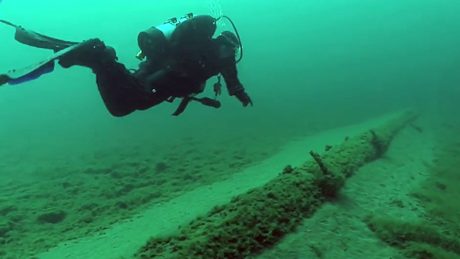MichMash: A History of Enbridge Pipeline Controversies in Michigan
Enbridge Energy’s Line 5 pipeline has come to represent an existential environmental threat for some members of the public.

The Line 5 pipeline carries petroleum products 645 miles from Wisconsin to Ontario in two pipes that sit in the water along the lake bed.
The decade-long fight over what to do about the aging oil and gas pipeline under the Straits of Mackinac is reaching a critical period. State regulators are reviewing permit requests from Enbridge Energy to bury Line 5 in a tunnel under the straits.
MichMash hosts Jake Neher and Cheyna Roth talk about the history of the pipeline and oil spills in Michigan.
Subscribe to MichMash on iTunes, Spotify, Google Podcasts, NPR One or wherever you get your podcasts.
Enbridge Energy’s Line 5 pipeline has come to represent an existential environmental threat for some members of the public. Opponents see the 67-year-old pipeline as a ticking time bomb. They say they want it out of the water before an inevitable catastrophe devastates the Great Lakes.
“The fact that it’s running through the heart of our Great Lakes is — it’s it’s really unacceptable,” said Nick Dodge, communications director for the Michigan League of Conservation Voters.
For supporters of Line 5, the pipeline means jobs and a way to heat the Upper Peninsula. The line sends 22.68 million gallons per day of crude oils and natural gas liquids through the line to later become propane. According to Enbridge, Line 5′s resources supplies 65% of the propane used in the Upper Peninsula. To shut down the line would mean cutting off energy to residents of Michigan, they say.
“It’s a critical, critical fuel for our state and for our citizens,” said Derek Dalling, executive director for Michigan Propane Gas Association.
Late in 2018, a deal was struck to build a new section of Line 5 that runs under the straits. That section would be housed inside a tunnel and buried underneath the bedrock of the Straits of Mackinac. The plan comes with a 99-year lease, effectively allowing Line 5, the entire line, to remain open for an indefinite future.
The tunnel proposal started a new era in the Line 5 debate.
Where the focus was once on getting the oil out of the water, environmental activists are now focused on addressing the larger problem with relying on fossil fuel infrastructure, while simultaneously increasing the chances of a spill by allowing the existing line to continue operating for several years until a replacement is finally ready.
Both parties are dug in and determined to fight until there are no more avenues to pursue. While opponents have evolved their arguments, supporters have steadily beat the drum of necessity. But this next stage in the Line 5 debate could be the end of the road for one side.
More from MichMash
Three Pieces of Advice to Make Sure Your Vote Counts This November
Detroit Arts Face Reckoning In MOCAD, DIA Toxic Workplace Allegations
Cities Brace for Low Census Response Rates As Deadline Nears
Trusted, accurate, up-to-date
WDET is here to keep you informed on essential information, news and resources related to COVID-19.
This is a stressful, insecure time for many. So it’s more important than ever for you, our listeners and readers, who are able to donate to keep supporting WDET’s mission. Please make a gift today.
